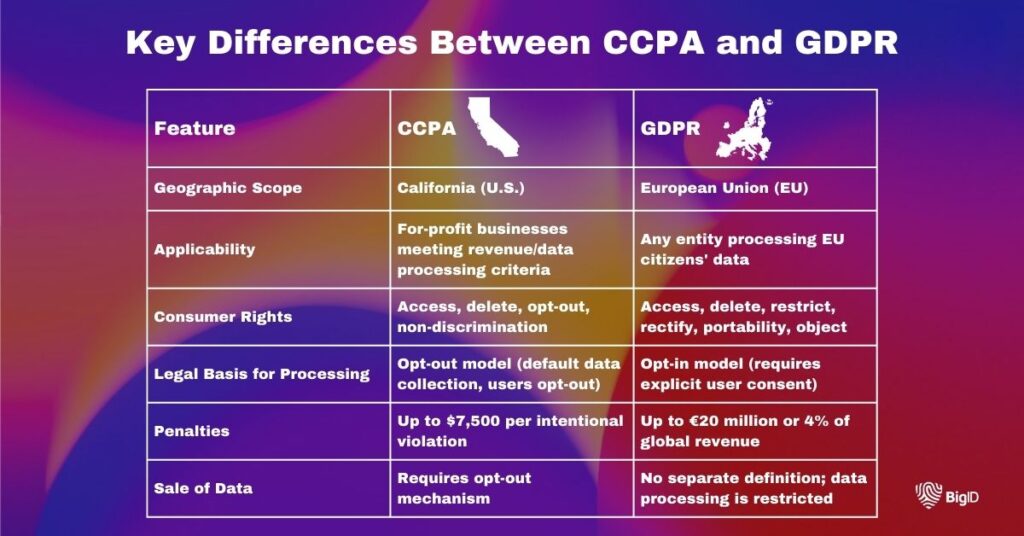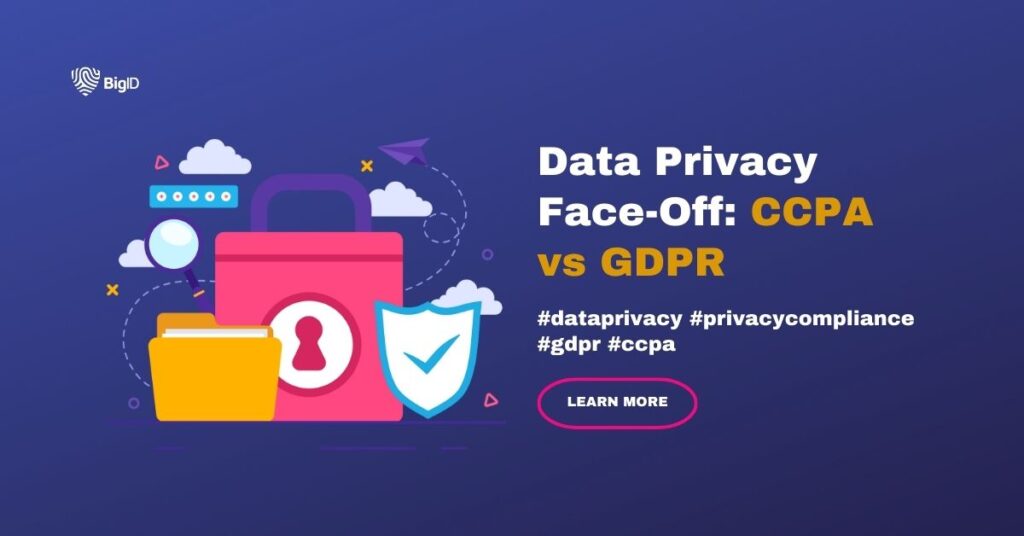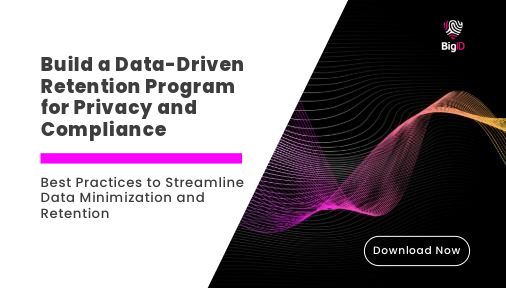Data privacy regulations have become a cornerstone of digital governance, shaping how businesses handle consumer information. Two of the most significant laws in this space are the California Consumer Privacy Act (CCPA) and the General Data Protection Regulation (GDPR). While both aim to protect consumer data, they differ in scope, requirements, and penalties.
Understanding these regulations is crucial for organizations operating globally or handling personal data. This article explores the meaning of CCPA and GDPR, their impact, key restrictions, fines, amendments, and common misunderstandings. Additionally, we’ll provide strategies to ensure compliance and minimize privacy risks.
What is CCPA?
The California Consumer Privacy Act (CCPA), enacted in 2018 and effective from January 1, 2020, grants California residents greater control over their personal data. It requires businesses to be transparent about data collection, usage, and sharing practices.
Who is Impacted?
CCPA applies to for-profit entities that do business in California and meet one or more of the following criteria:
- Annual gross revenue exceeds $25 million
- Processes data of 100,000 or more California residents, households, or devices
- Derives at least 50% of its revenue from selling consumer data
Data Subject Rights Under CCPA
- Right to Know: Consumers can request details about what personal information is collected, shared, or sold.
- Right to Delete: Individuals can request deletion of their data.
- Right to Opt-Out: Consumers can prevent their data from being sold.
- Right to Non-Discrimination: Businesses cannot discriminate against users who exercise their CCPA rights.
What is GDPR?
The General Data Protection Regulation (GDPR) is a European Union (EU) law that came into effect on May 25, 2018. It is one of the world’s strictest data privacy laws, aiming to protect EU citizens’ personal data.
Who is Impacted?
GDPR applies to any organization, regardless of location, that:
- Processes personal data of individuals in the EU
- Offers goods or services to EU residents
- Monitors EU users’ online behavior
Data Subject Rights Under GDPR
- Right to Access: Individuals can request access to their data.
- Right to Rectification: Consumers can correct inaccurate personal data.
- Right to Erasure (Right to Be Forgotten): Users can request data deletion under certain conditions.
- Right to Restrict Processing: Individuals can limit how their data is used.
- Right to Data Portability: Consumers can request their data in a readable format and transfer it to another service.
- Right to Object: Users can object to data processing for marketing purposes.

Amendments and Updates
- CCPA 2.0 – CPRA (California Privacy Rights Act): Effective January 1, 2023, the CPRA strengthens CCPA by introducing additional consumer rights, such as right to correct personal data and increased opt-out controls for sensitive data.
- GDPR Post-Brexit Impact: The UK now has its own version, the UK GDPR, which closely mirrors the EU GDPR but includes some region-specific modifications.
Common Misconceptions About CCPA and GDPR
- “Only companies in California or the EU need to comply.”
- False. Any business that collects data from California or EU residents may be subject to these regulations.
- “GDPR and CCPA are the same.”
- Not exactly. GDPR focuses on user consent, while CCPA emphasizes opt-out rights.
- “Fines are only for major violations.”
- Both laws impose significant fines, even for procedural errors. British Airways faced a €20 million fine under GDPR for a data breach, while Sephora paid a $1.2 million fine under CCPA for non-compliance.
How Organizations Can Ensure Compliance
1. Conduct a Data Audit
- Identify what personal data is collected
- Determine where it’s stored
- Understand how it’s processed and shared
2. Update Privacy Policies
- Clearly state data collection practices
- Provide an easy mechanism for users to exercise their rights
3. Implement User Rights Management
- Set up request portals for access and deletion
- Enable opt-out options for data sales (CCPA)
- Offer consent mechanisms (GDPR)
4. Strengthen Data Security
- Encrypt sensitive data
- Limit data retention periods
- Conduct regular security assessments
5. Train Employees
- Educate staff on CCPA and GDPR obligations
- Ensure marketing and sales teams handle data appropriately
Achieve GDPR and CCPA Compliance with BigID
Despite their different approaches, CCPA and GDPR are pivotal in protecting consumer privacy. Today’s organizations must assess their data practices, implement comprehensive compliance strategies, and remain proactive in privacy risk management. BigID is the industry lending platform for data privacy, security, compliance, and AI data management. Leveraging advanced AI and machine learning, BigId empowers organizations to get better visibility and value from their enterprise data both in the cloud and on-prem.
- Know Your Data: Automatically classify, categorize, tag, and label sensitive, personal data with accuracy, granularity, and scale.
- Enforce Privacy Policies: Ensure alignment and enforcement of data policies in accordance with privacy mandates to fulfill regulatory compliance requirements.
- Automate Data Rights Management: Automate individual, personal data rights fulfillment requests from access and updates to appeals and deletion.
- Universal Consent & Preferences Management: Manage and adjust consumer consent and preferences universally and centrally across various channels with ease.
- Track AI Violations & Ethics: Assess and monitor AI technology and usage across the organization to protect: personal data and remediate risk.
To avoid fines that can reach up to 4% of global revenues— book a 1:1 demo with our privacy experts today.
General FAQs
1. What is the main difference between CCPA and GDPR?
CCPA is an opt-out model where consumers can prevent their data from being sold, while GDPR is an opt-in model that requires explicit consent before data collection.
2. Who needs to comply with CCPA and GDPR?
CCPA applies to businesses that meet revenue or data processing thresholds in California. GDPR applies to any business that collects or processes data of EU residents, regardless of location.
3. Does CCPA apply to non-profit organizations?
No, CCPA applies only to for-profit businesses that meet certain criteria.
4. Can a company be fined under both GDPR and CCPA?
Yes, if a company operates in both California and the EU and violates both regulations, it may face separate fines under each law.
Consumer Rights and Compliance
1. How can consumers exercise their rights under CCPA?
Businesses must provide a clear mechanism (such as a web form or phone number) for consumers to request access, deletion, or opt-out of data sales.
2. How does GDPR handle data subject requests compared to CCPA?
GDPR includes additional rights, such as rectification and portability, requiring businesses to provide requested data in a structured format.
3. Is it mandatory to have a “Do Not Sell My Personal Information” link under CCPA?
Yes, if a business sells consumer data, it must display this link prominently on its website.
4. How does CCPA define “sale” of data?
Any exchange of personal data for monetary or other valuable consideration is considered a sale, even if data is shared between business partners.
Penalties and Enforcement
1. What are the penalties for non-compliance with CCPA?
Fines can go up to $7,500 per intentional violation and $2,500 per unintentional violation, enforced by the California Attorney General.
2. What are the penalties under GDPR?
Fines can reach €20 million or 4% of global revenue, whichever is higher.
3. Has any company been fined under both regulations?
While fines under each law are separate, global companies like Meta, Google, and Amazon have faced significant penalties for data privacy violations.
Practical Implementation
1. How can businesses prepare for compliance with both laws?
Conduct a data audit, update privacy policies, implement consumer request systems, and train employees on data handling practices.
2. Do businesses need different policies for GDPR and CCPA?
While similar, businesses may need separate policies since GDPR requires consent mechanisms, while CCPA mandates opt-out mechanisms.
3. How long do businesses have to respond to consumer data requests?
Under CCPA, businesses have 45 days to respond, extendable by another 45 days. Under GDPR, they must respond within 30 days.
4. Can businesses use third-party data processors under GDPR and CCPA?
Yes, but they must ensure these processors comply with security and legal requirements, with clear data processing agreements (DPAs) in place.



